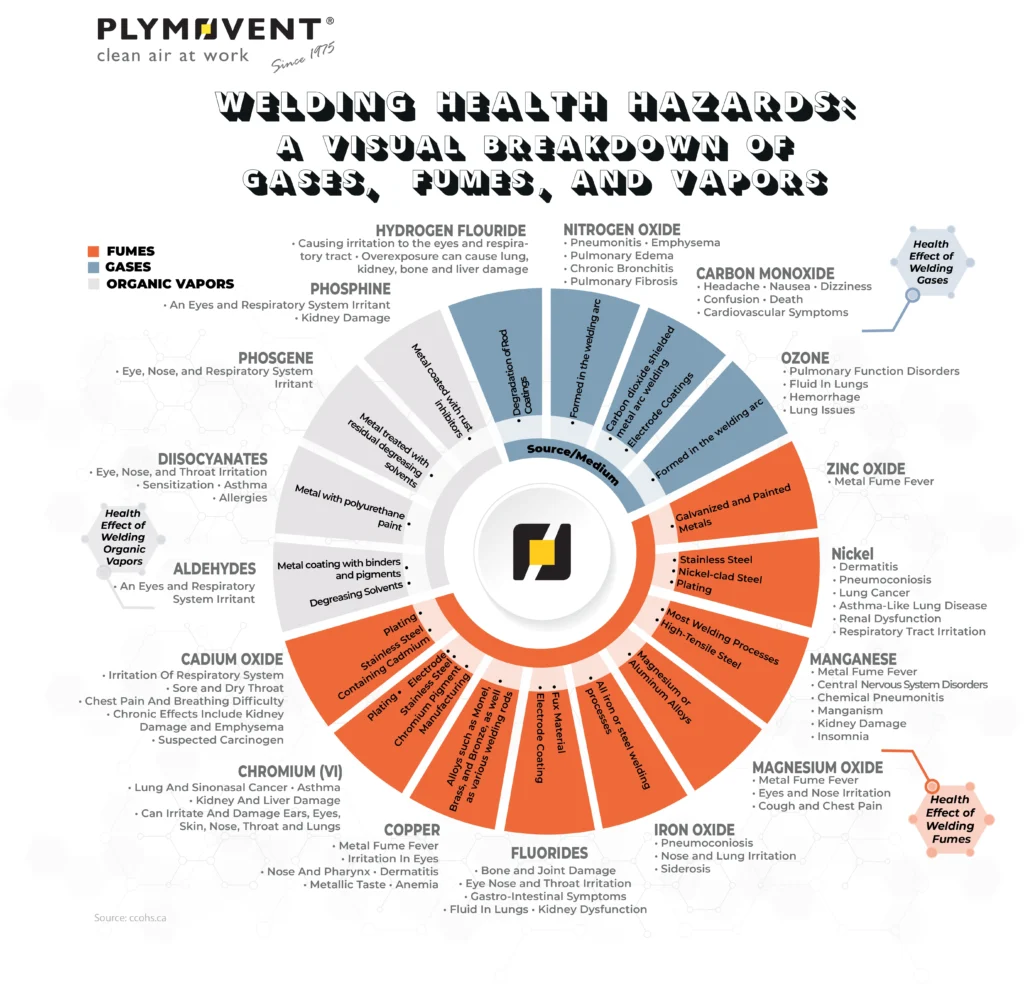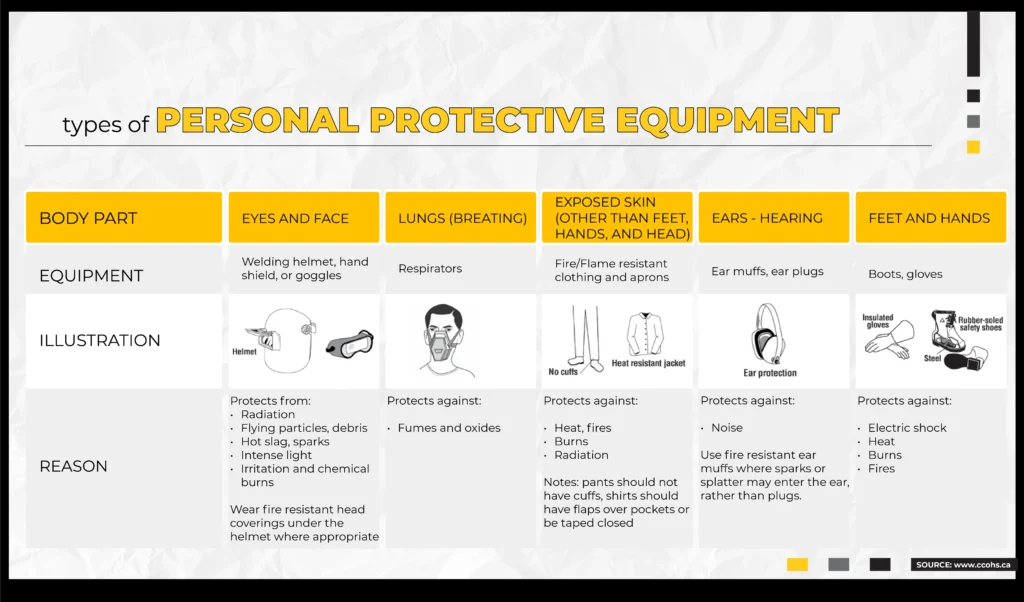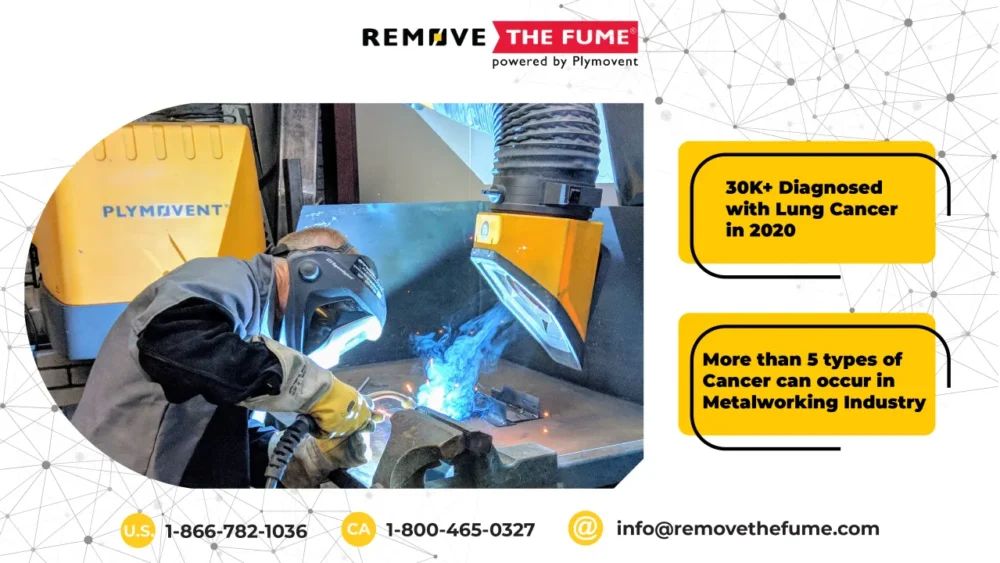National Welding Month is a time to recognize the incredible skill and dedication of welders who form the backbone of various industries. At Plymovent, we’re committed to supporting welders by providing clean air solutions that ensure a safe and healthy work environment. This April, we invite you to celebrate National Welding Month with Plymovent.
Welding can be very rewarding, but your safety is non-negotiable
Although Welding is a rewarding skill, it is beneficial to know the potential health risks associated with it. This article/blog focuses on providing you the knowledge about the risks of welding and highlights the safety tips that could be utilized to minimize these risks.
Understanding Welding Fumes and Health Risks
Welding involves intense heat that melts metals, creating fumes and gases composed of various particles depending on the type of metal being welded and the welding process used. Here’s a breakdown of the common types of fumes, gases, and organic vapors and their potential health impacts:
- Magnesium Oxide: This is the most common type of fume generated during welding. It is formed when metals combine with oxygen. Exposure to this can lead to irritation in the respiratory system, causing coughing and chest pain. It can also lead to Metal Fume Fever.
- Ozone: Produced oftentimes during the TIG welding process, ozone can irritate the airways and cause chest tightness leading to various Pulmonary Function Disorders.
- Phosphine: Phosphine is created when a rust inhibitor reacts with the welding radiation. It is highly toxic and can irritate the eyes and respiratory system. Too much exposure can also lead to kidney damage.
Apart from the above, many other gases, fumes, and vapors are toxic to you. You can refer to the infographic below to get a better in-depth understanding of which category they fall into (fume, gases, or vapors) and what type of effects they can cause on your body.

Even though these gases can be harmful, you can significantly reduce the risks towards them by incorporating proper safety measures. Here are some essential welding safety tips for beginners:
Gear
- Helmet: Always wear a welding helmet that suits your welding requirement’s shade level. This will help protect your eyes from intense UV radiation and sparks.
- Gloves and Sleeves: Protect your hands and arms from burns and sparks by using heavy-duty gloves and sleeves.
- Leggings and Footwear: Similarly, protect your legs from heat and sparks with fire-resistant leggings. Add to your safety by wearing sturdy closed-toe shoes

Posture
- Maintain Good posture: Avoid strain and fatigue by standing with a straight back and feet shoulder-width apart.
- Arc Length: Another good practice is to maintain a recommended arc length to reduce splatter and fume generation.
Safe Work Practices
- Proper Ventilation: Always work in a well-ventilated area to disperse fumes and gases.
- Cleanliness: Different types of elements can react differently with welding fumes. Hence, it is recommended to clean your working station before you start welding.
- Thorough Inspection: Ensure your equipment is in good working order, and all connections are secure before starting any welding work.
- Hydration: Make sure to stay hydrated as it helps in flushing out the toxins out of the body.
- Right Fume Extraction Machinery: Lastly, investing in good fume extraction systems is always the right choice. Plymovent offers a comprehensive range of fume extraction solutions specifically designed for the welding industry. These fume extractors capture harmful contaminants at the source, ensuring a cleaner and healthier work environment. Be it for light-duty or heavy-duty use, Plymovent offers you a wide range of fume extraction systems, both mobile and stationary, to meet your needs!
Remember, #welding can be very rewarding, but your safety is non-negotiable. By prioritizing your safety, you can enjoy a healthy and long-lasting welding career.
Explore our selection of fume extractors and enjoy a 10% discount throughout National Welding Month: https://bit.ly/3Ut0jGh




Comments are closed.